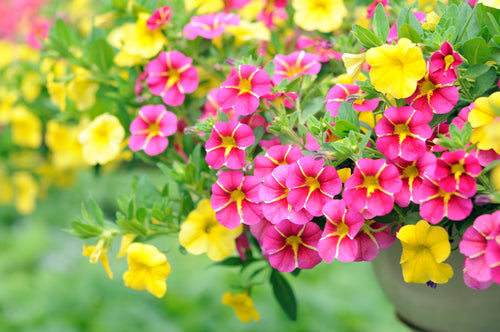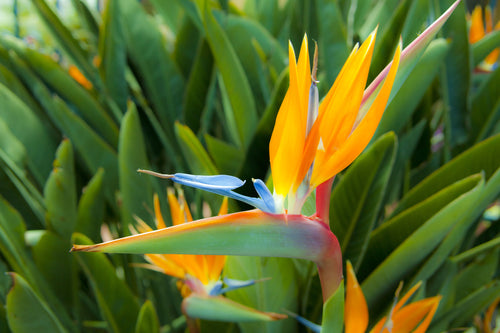Eighteen elements are considered essential for plant growth. Carbon, hydrogen, and oxygen are primarily supplied by air and water. Plant roots absorb the remaining 15 elements from the surrounding soil. These elements are divided into three groups based on their relative abundance in plants: Primary Nutrients (or Major Nutrients, Secondary Nutrients (or Minor Nutrients, and Trace Nutrients (or Micronutrients. Although the Major Nutrients are needed in the greatest quantities, a deficiency of any one nutrient can prevent plant growth, or reduce it to unsatisfactory levels. Even though some soils may already contain these nutrients, they may not be in a form available for plant growth. The best way to ensure that all of the nutrients are available in the soil is through regular applications of plant foods. The table below provides more information on each nutrient, its deficiency symptoms, and possible plant foods to cure the deficiency.
Primary Nutrients |
|||
| Function | Deficiency Symptoms | *Solutions | |
| Nitrogen | Vigorous growth & dark green color | Light green leaves; stunted growth | Dried Blood, Garden Manure, Cottonseed Meal, Ammonium Sulfate, Urea |
| Phosphorus | Root development & flowering | Smaller yields of seeds & fruit; purplish leaves, stems & branches; | Rock Phosphate, Bone Meal, Single Superphosphate, Triple Superphosphate |
| Potassium | Overall hardiness & disease resistance | Reduced yields; Spotted or curled leaves; Weak root system | Sulfate of Potash, Sulfate of Potash Magnesia, Muriate of Potash, Greensand |
Secondary Nutrients |
|||
| Function | Deficiency Symptoms | *Solutions | |
| Calcium | Plant vigor; Aids in uptake of nutrients | Deformed terminal leaves; Poor root growth | Garden Lime, Garden Gypsum |
| Magnesium | Essential part of chlorophyll | Yellowing of older leaves | Garden Lime, Sulfate of Potash Magnesia |
| Sulfur | Dark green color; Seed production | Yellow leaves; Stunted, spindly plants | Garden Sulfur, Sulfate of Potash, Gypsum |
Trace Nutrients |
|||
| Function | Deficiency Symptoms | *Solutions | |
| Boron | Increases flowering & fruit development | Terminal buds die; Less flowers & fruit develop | Garden Manure, Bone Meal |
| Chlorine | Helps control water loss & moisture stress | Plants wilt; yellow leaves | Muriate of Potash, Garden Manure, Greensand |
| Cobalt | Improves growth & transpiration | Reduced growth and yellowing of foliage | Greensand, Kelp, Cottonseed Meal |
| Copper | Helps produce chlorophyll | Yellow, wilted leaves; Lack of flowering | Garden Manure, Greensand |
| Iron | Promotes dark green leaves | Yellow leaves | Greensand, Garden Manure, Cottonseed Meal |
| Manganese | Helps produce chlorophyll | Intervenous chlorosis in younger leaves | Garden Manure, Greensand |
| Molybdenum | Essential in some enzyme systems | Pale green, rolled or cupped leaves | Greensand, Lime (makes it more available) |
| Sodium | Aids water regulation & photosynthesis | Plants wilt | Kelp, Garden Manure, Bone Meal, Greensand |
| Zinc | Enzyme & growth hormone production | Yellow leaves, Rosetted (clustered) leaves | Garden Manure, Greensand, Cottonseed Meal |
* Espoma Tones contain ALL 15 essential nutrients so they can cure all of the above nutrient deficiencies
The above information is provided courtesy of the Espoma Company, www.espoma.com.









